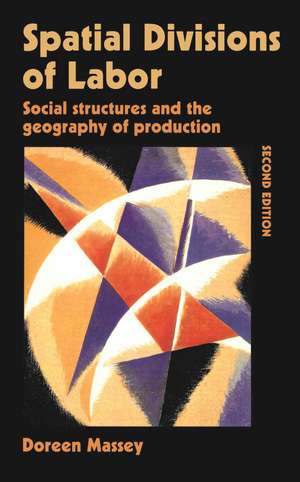Spatial Divisions of Labor
Autor Doreen Masseyen Limba Engleză Paperback – 2 aug 1995
Preț: 278.65 lei
Nou
Puncte Express: 418
Preț estimativ în valută:
53.32€ • 57.02$ • 44.46£
53.32€ • 57.02$ • 44.46£
Comandă specială
Livrare economică 27 martie-10 aprilie
Doresc să fiu notificat când acest titlu va fi disponibil:
Se trimite...
Preluare comenzi: 021 569.72.76
Specificații
ISBN-13: 9780415912969
ISBN-10: 0415912962
Pagini: 410
Dimensiuni: 138 x 216 mm
Greutate: 0.76 kg
Ediția:Revizuită
Editura: Taylor & Francis
Colecția Routledge
Locul publicării:Oxford, United Kingdom
ISBN-10: 0415912962
Pagini: 410
Dimensiuni: 138 x 216 mm
Greutate: 0.76 kg
Ediția:Revizuită
Editura: Taylor & Francis
Colecția Routledge
Locul publicării:Oxford, United Kingdom
Public țintă
Academic and PostgraduateNotă biografică
Doreen Massey is Professor of Geography at the Open University.
Recenzii
"If by "classic" is meant a widely cited standard work, then such is Doreen Massey's Spatial Divisions of Labor. Her book unquestionably ranks as one of the most significant to have appeared within the geographical literature over the past decade or so." -- Progress in Human Geography
"The book is a considerable achievement in a whole variety of ways. Its scope is enormous, the theoretical framework innovatory, and the method exemplary. New concepts are introduced, theory and empirical analysis are carefully interwoven, and there is a valuable combination of breadth and depth in the analysis. Last but not least the book is of considerable relevance to a range of current political debates and the approach should provoke a good deal more empirical research." -- Environment and Planning A
"With this provocative and stimulating book Marxist economic geography has come of age." -- Geography
". . . a powerful and convincing statement of a particular point of view which will, I am sure, be seen as something of a milestone in times to come. . . . an impressive achievement . ." -- International Journal of Urban and Regional Research
"Massey's radical theoretical discussion is stimulating and valuable, and her review of the evidence is persuasive, and useful in helping us understand some of the links between the regional mosaic of industry and local social and political diversity. . . . the book is a significant and worthwhile endeavor." -- Reviewing Sociology
". . . a major contribution and should become a standard text." -- Urban Studies
"The book is a considerable achievement in a whole variety of ways. Its scope is enormous, the theoretical framework innovatory, and the method exemplary. New concepts are introduced, theory and empirical analysis are carefully interwoven, and there is a valuable combination of breadth and depth in the analysis. Last but not least the book is of considerable relevance to a range of current political debates and the approach should provoke a good deal more empirical research." -- Environment and Planning A
"With this provocative and stimulating book Marxist economic geography has come of age." -- Geography
". . . a powerful and convincing statement of a particular point of view which will, I am sure, be seen as something of a milestone in times to come. . . . an impressive achievement . ." -- International Journal of Urban and Regional Research
"Massey's radical theoretical discussion is stimulating and valuable, and her review of the evidence is persuasive, and useful in helping us understand some of the links between the regional mosaic of industry and local social and political diversity. . . . the book is a significant and worthwhile endeavor." -- Reviewing Sociology
". . . a major contribution and should become a standard text." -- Urban Studies
Cuprins
Part I: Issues: Part II: Social Relations and Spatial Organisation: 1. The Debate; 2. Characterising Capital; 3. Social Structures and Capitalist Relations of Production; 4. The Social and the Spatial: an Impossible Dichotomy; 5. An Example; Part III: Uneven Development and Spatial Structures: 6. The Approach; 7. Spatial Structures of Capitalist Production; 8. Spatial Structures of Production and Geographical Inequality; 9. The Uniqueness of Space; Part IV: Some Changing Spatial Structures in the United Kingdom: 10. Setting the Scene; 11. Electronics and Instruments Industries; 12. Clothing and Footwear; 13. Services; Part V: The Effects on Local Areas: Class and Gender Relations: 14. The General and the Unique; 15. The Coalfield Areas; 16. A Different Kind of 'Periphery': The Case of Cornwall; Part VI: Class, Politics and the Geography of Employment: 17. Spatial Structures and Spatial Divisions of Labour; 18. Uneven Development and National Politics; 19. Changes in the Geography of Class Relations; Part VII: The Reproduction of Inequality: A Question of Politics: Part VIII: Reflections on Debates over a Decade: 20. Themes; 21. Marxism and the Analysis of Capitalism; 22. Explanation; 23. The Conceptualisation of Space; 24. Gender and Feminism.
